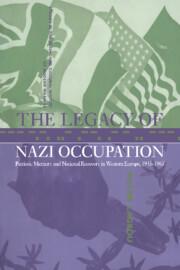Book contents
- Frontmatter
- Contents
- List of illustrations
- Acknowledgements
- List of abbreviations
- Introduction
- Part I Troublesome heroes: the post-war treatment of resistance veterans
- Part II Repatriating displaced populations from Germany
- Part III The legacy of forced economic migration
- 7 Labour and total war
- 8 Moral panic: ‘the soap, the suit and above all the Bible’
- 9 Patriotic scrutiny
- 10 ‘Deportation’: the defence of the labour conscripts
- Part IV Martyrs and other victims of Nazi persecution
- Conclusion
- Bibliography
- Index
10 - ‘Deportation’: the defence of the labour conscripts
Published online by Cambridge University Press: 02 December 2009
- Frontmatter
- Contents
- List of illustrations
- Acknowledgements
- List of abbreviations
- Introduction
- Part I Troublesome heroes: the post-war treatment of resistance veterans
- Part II Repatriating displaced populations from Germany
- Part III The legacy of forced economic migration
- 7 Labour and total war
- 8 Moral panic: ‘the soap, the suit and above all the Bible’
- 9 Patriotic scrutiny
- 10 ‘Deportation’: the defence of the labour conscripts
- Part IV Martyrs and other victims of Nazi persecution
- Conclusion
- Bibliography
- Index
Summary
Had they been united by working-class solidarity and supported by organised networks of patriotic resistance, the individual workers – crushed by war and occupation, abandoned to their fate by collaborating labour administrations – would not have left for Germany in the first place. Did their common experience in Germany offer them greater unity? Their geographical dispersion and the great variety of individual working and living conditions made it wholly improbable that the workers would have set up some form of self-help association before their return. Who then would take on their defence, undertake their rehabilitation in the face of moral and patriotic suspicion? In Belgium it was the JOC; in France, Frénay; in the Netherlands, some regrettable clusters of bad advocates who associated their particular cause with that of the workers in Germany at large.
The Belgian JOC had been very active during the war through its ‘Service for Workers Abroad’, organised in 1942 to shield Catholic workers from moral temptations and spiritual loss, as described in chapter 8. After the repatriation, the post-war challenge was to reintegrate, re-educate and re-Christianise the workers who returned from Germany. A local JOC chaplain declared that the post-war vocation of the organisation was ‘to turn them back into the neat human beings they were before they left for Germany three years ago’. Given the loss of Catholic influence resulting from the exile in Germany, an explicitly Catholic organisation would find it almost impossible to retrieve these repatriated workers.
- Type
- Chapter
- Information
- The Legacy of Nazi OccupationPatriotic Memory and National Recovery in Western Europe, 1945–1965, pp. 167 - 196Publisher: Cambridge University PressPrint publication year: 1999

